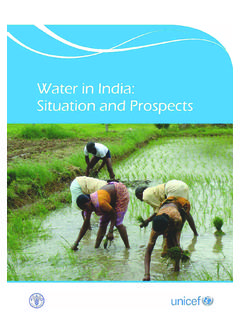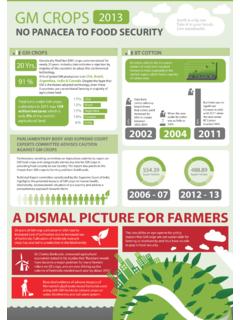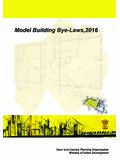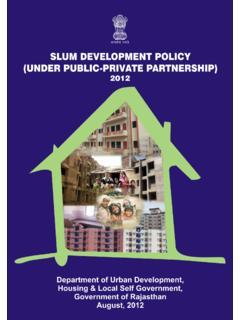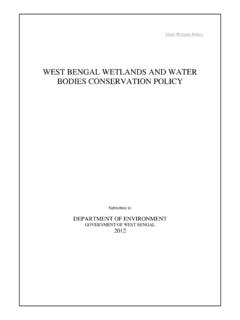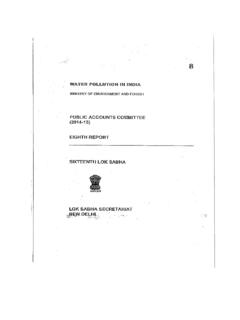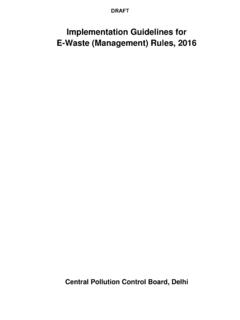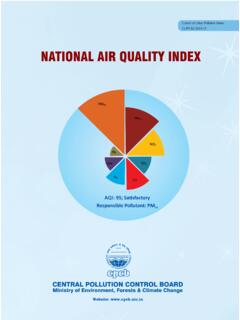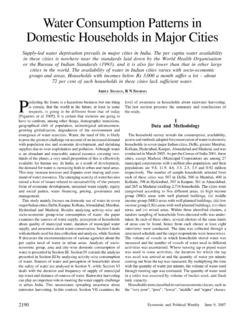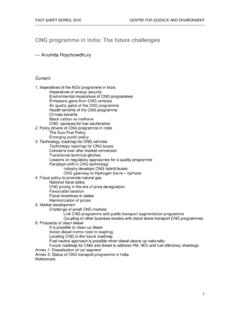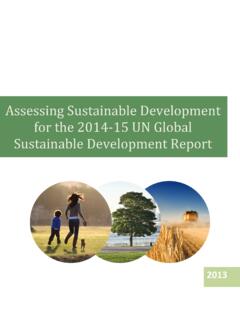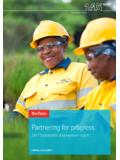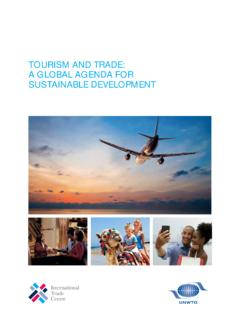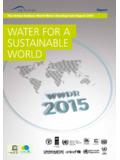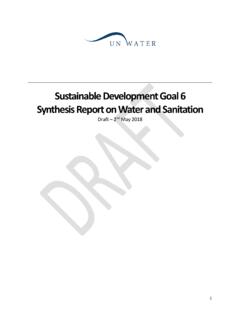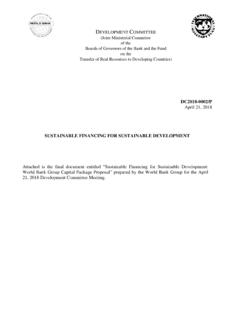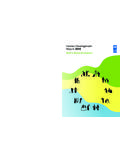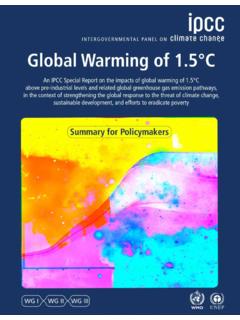Transcription of Prototype Global Sustainable Development Report
1 Executive Summary Prototype Global Sustainable Development Report Executive Summary Acknowledgements: This Report was drafted by the Division for Sustainable Development , UN Department of Economic and Social Affairs (DESA), with inputs from CBD, DESA, ECLAC, ESCAP, ECE, ESCWA, FAO, ILO, IAEA, IMO, OHRLLS, UNCCD, UNCTAD, UNEP, UNESCO, UNFCCC, UNFPA, UN-Habitat, UNIDO, WFP and World Bank. The IMF participated as an observer. We are especially grateful for the contributions of many scientists and economists. A complete list of contributors is available in the Report . Disclaimer: The views expressed in this publication are those of the authors and do not necessarily reflect those of the United Nations or its senior management. The terms country/economy as used in this Report also refer, as appropriate, to territories or areas; the designations employed and the presentation of the material do not imply the expression of any opinion whatsoever on the part of the Secretariat of the United Nations concerning the legal status of any country, territory, city or area or of its authorities, or concerning the delimitation of its frontiers or boundaries.
2 In addition, the designations of country groups are intended solely for statistical or analytical convenience and do not necessarily express a judgment about the stage of Development reached by a particular country or area in the Development process. The major country groupings used in this Report follow the classification of the United Nations Statistical Office. Reference to companies and their activities should not be construed as an endorsement by the UN of those companies or their activities. The boundaries and names shown and designations used on the maps presented in this publication do not imply official endorsement or acceptance by the United Nations. Suggested citation: United Nations (2014). Prototype Global Sustainable Development Report - Executive Summary. Online edition. New York: United Nations Department of Economic and Social Affairs, Division for Sustainable Development , Division for Sustainable Development Prototype Global Sustainable Development Report Executive Summary United Nations Department of Economic and Social Affairs 2 1.
3 Sustainable Development brought together the great Global issues Since the creation of the United Nations, the world s peoples have aspired to make progress on the great Global issues of peace and security, freedom, Development , and environment. Peace and security, freedom, Development , and environment remain prominent aspirations today, and it has been increasingly acknowledged that they are closely interlinked. High-level panels and commissions, major documents, and Global conferences have all made a moral and pragmatic case for progress in the UN Charter goals. Insufficient Development progress can threaten peace and security and vice versa. Development provides the capacity to sustain nature s life support systems, but can also threaten them, in turn setting back Development . The concept of Sustainable Development brought together Development and environment Strong interdependencies are now recognized among the economic, social and environmental dimensions of Sustainable Development .
4 Since the 1960s, natural and social scientists have highlighted a series of Sustainable Development issues and recommended integrated policy action and commensurate means of implementation, such as technology, finance, capacity building and trade. In the Brundtland Report , the concept of Sustainable Development is defined as a Development that meets the needs of the present without compromising the ability of future generations to meet their own needs . The Brundtland Report of 1987, entitled Our Common Future, defined the concept of Sustainable Development , which is grounded in equity and shared well-being both within and across generations. Sustainable Development was subsequently adopted as an overarching objective by Governments at the Earth Summit of 1992 in Rio de Janeiro, together with a set of Rio Principles and a Global action plan, Agenda 21, which included many goals and targets, some of which informed the Millennium Development Goals a decade later.
5 The time has come to reconnect science and policy. The policy framework itself emerged with limited direct scientific input. The World Commission on Environment and Development was dominated by politicians and little science was present at the Earth Summit in Rio de Janeiro in 1992. Ten years later at the Johannesburg World Summit on Sustainable Development , there was some scientific presence. In 2012 at Rio+20 , the UN Conference on Sustainable Development , science was very prominent. One reason is the emergence of sustainability science as a new interdisciplinary, unified scientific endeavour in the 2000s. It commanded an estimated 37,000 authors based in 174 countries in 2010. At Rio+20, many scientific and policy assessment reports were presented in a large number of side events. Yet, the absence of a comprehensive and authoritative Global Sustainable Development Report was striking twenty years after the Earth Summit.
6 Our Common Journey (NRC, 1999) and Sustainable Development in the 21st Century (UN, 2012) were important steps toward an authoritative Global Report that would bring together the range of existing assessments across sectors, assessing past progress and exploring future pathways, taking into account the perspectives of different scientific communities across the world and also responding to the needs of policy makers for the best available scientific evidence on Sustainable Development issues in an easily digestible form. 3 2. A Prototype Global Sustainable Development Report The Rio+20 outcome document (paragraph 85k) calls for a Global Sustainable Development Report , in order to bring together dispersed information and existing assessments and to strengthen the science-policy interface at the high-level political forum on Sustainable Development (HLPF). The 2012 Secretary General s High-level Panel on Global Sustainability had a similar proposal.
7 Following Rio+20, the UN Secretary-General tasked the Division for Sustainable Development of the Department of Economic and Social Affairs to undertake in-depth analysis and evaluation of trends and scientific analysis in the implementation of Sustainable Development , including lessons learned, best practices and new challenges, and cross-sectoral analysis of Sustainable Development issues .1 It was decided to produce a Prototype Report that could illustrate a range of potential content, alternative approaches and various ways of participation. The Prototype Report will be useful in supporting Member States deliberations on the scope and methodology of future editions of the Global Sustainable Development Report . The Report should ideally inform the agenda and deliberations of the HLPF, the General Assembly and ECOSOC on Sustainable Development . The Prototype Report is a UN system effort with participation of social and natural scientists and seeks to facilitate dialogue between scientists and decision-makers.
8 It focuses on Global Sustainable Development in terms of issues, impacts, institutions and technology. It maps Sustainable Development assessments and related processes and highlights emerging issues identified by scientists; assesses Sustainable Development progress; tells the stories of future pathways toward Sustainable Development based on the literature and discusses investment and technology needs; assesses various approaches to measuring Sustainable Development progress; identifies lessons learnt from national, regional and Global case studies of the climate-land-energy-water- Development nexus; presents illustrative science digests for decision-makers; and suggests a number of issues for consideration. A UN Task Team was formed to work on the Prototype Report . An invitation was sent to the 53 UN entities comprising ECESA-Plus2 of which 21 have actively partnered on this task: Convention on Biological Diversity (CBD), UN Department of Economic and Social Affairs (DESA), UN Economic Commission for Europe (ECE), UN Economic Commission for Latin America and the Caribbean (ECLAC), UN Economic and Social Commission for Asia and the Pacific (ESCAP), United Nations Economic and Social Commission for Western Asia (ESCWA), Food and Agriculture Organization (FAO), International Atomic Energy Agency (IAEA), International Labour Organization (ILO), International Maritime Organization (IMO), Office of the High-Representative for the Least Developed Countries, Land-locked Developing and Small Island Developing States (OHRLLS), United Nations Convention to Combat Desertification (UNCCD), United Nations Conference on Trade and Development (UNCTAD), United Nations Environment Programme (UNEP), United Nations Educational, Scientific and Cultural Organization (UNESCO)
9 , United Nations Framework Convention on Climate Change (UNFCCC), United Nations Industrial Development Organization (UNIDO), United Nations Population Fund (UNFPA), UN Human Settlements Programme (UN-Habitat), World Food Programme (WFP), and World Bank. The International Monetary Fund participated as an observer. DESA has reached out to scientific communities across the world, including through a number of expert group meetings. A multi-lingual crowd-sourcing platform (currently in English, Spanish and Chinese) has been used to collect a wider range of views from thousands of scientists across the world. In fact, key messages and findings of the Report have emerged from the crowd-sourced views and evidence rather than being decided by UN staff or selected scientists. While this crowd-sourcing exercise proved a useful tool to identify new and emerging issues that scientists would like decision-makers to consider, protocols for evaluating non-conventional sources of scientific knowledge might be needed in the future.
10 4 3. Assessments for Sustainable Development Assessments addressing broad and complex topics are typically prepared for decision-makers by drawing on large and representative groups of experts. They are problem-driven and typically synthesize scientific findings on complex issues, reducing complexities. They inevitably make judgments but generally aim to separate clearly descriptive from normative elements of the assessment. In order to support decision-making, statements specifying probabilities and uncertainties are essential but not easy to communicate. International scientific assessments Of the thousands of relevant Sustainable Development assessments, the present Report consulted 205 international assessments: 57 international assessments suggested through the crowdsourcing website; 125 flagship publications of the UN system; and 23 outlook reports prepared by intergovernmental organizations. According to our crowdsourcing results, prominent intergovernmental scientific assessments and UN publications came out on top of the list of assessments that scientists considered important to bring to the attention of decision-makers.
